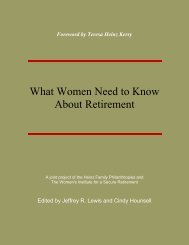What Women Need to Know About Retirement - Wiser
What Women Need to Know About Retirement - Wiser
What Women Need to Know About Retirement - Wiser
You also want an ePaper? Increase the reach of your titles
YUMPU automatically turns print PDFs into web optimized ePapers that Google loves.
Workers, employers or both can contribute <strong>to</strong> defined contribution plans, which include the<br />
popular 401(k). The plans typically give you a tax break on the money you contribute. For<br />
example, if your annual earnings are $30,000, and you contribute $3,000 <strong>to</strong> a traditional 401(k)<br />
plan, your income tax will be based on annual earnings of $27,000. Your contributions, your<br />
employer’s contributions, and investment returns aren’t taxed until you withdraw your money.<br />
(You may also be eligible for a plan that gives the tax break when you take the money out in<br />
retirement, rather than as you’re putting the money in; these are known as Roth plans.)<br />
The purpose of all employment-based plans is <strong>to</strong> help provide security in retirement. Be aware<br />
that most plans include a vesting provision. This means you have <strong>to</strong> stay with a company for a<br />
certain amount of time <strong>to</strong> qualify for benefits from the plan. However, once benefits are vested,<br />
you get a benefit even if you no longer work for that employer. For example, in a defined<br />
contribution plan with a five-year vesting requirement, you have <strong>to</strong> work the full five years in<br />
order <strong>to</strong> earn the employer match. In a defined benefit plan with five-year vesting, you have <strong>to</strong><br />
work the full five years <strong>to</strong> earn any benefit at all. It’s important <strong>to</strong> learn the rules.<br />
Information about your plan is contained in a Summary Plan Description, (SPD). The SPD will<br />
outline the conditions for participation in the plan.<br />
The SPD for a defined benefit plan will provide vesting information, the formula for how<br />
benefits are calculated and other information such as early retirement benefits, death benefits, or<br />
disability benefits. A defined contribution plan SPD will give you such useful information as<br />
your investment options, the contribution limits, the employer match amount, the vesting period,<br />
and either how the benefits will be paid, or what payout options are available.<br />
Guidelines for Making Good Use of Employer Plans<br />
For many women, pensions are just not available. The realities of family life are such that<br />
women spend on average only 27 years in the workforce, compared <strong>to</strong> 40 years for men. Our<br />
current retirement system wasn’t designed with working women in mind: Their part-time and<br />
intermittent employment due <strong>to</strong> family caregiving responsibilities can mean that they aren’t<br />
eligible or can’t vest in the plan. If you or your spouse have a choice about employment, and<br />
other things are equal, look for an organization with good retirement benefits. Most of all protect<br />
your future security by making the best use of what is available <strong>to</strong> you.<br />
Here are some things you can do <strong>to</strong> make the best use of the benefits you do have:<br />
� Check on whether your employer is doing well <strong>to</strong> increase the chances of a good outlook<br />
for continued employment and continued benefits.<br />
� Save at least the amount matched by your employer in 401(k) plans and other defined<br />
contribution plans.<br />
� When investing funds, don’t put all your eggs in one basket—diversify.<br />
� Don't use retirement money for non-retirement purposes.<br />
� If you are thinking about switching jobs, remember <strong>to</strong> look at the vesting schedule where<br />
you are and stay at least that long.<br />
� If you are self-employed, don’t forget <strong>to</strong> save—you need retirement income <strong>to</strong>o.<br />
� Remember that plan funds are an asset at the time of a divorce, and in the long run, might<br />
be the most important asset you have.<br />
� Don't retire <strong>to</strong>o early, and remember that your money needs <strong>to</strong> last a lifetime.<br />
52




